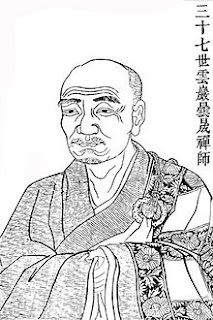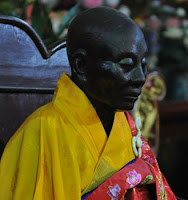
The Second Patriarch of Chinese
Zen was Huike. He was a Confucian scholar who sought a teacher to help him
resolve the concerns about life and death which weighed heavily on his mind. He
had visited many teachers, Confucian, Taoist, and Buddhist.
He studied all three traditions and was well
versed not only in the Confucian classics but also in the doctrines of both the
Theravada and Mahayana schools of Buddhism.
Nothing, however, had brought him peace of mind.
In desperation he sought out the old
barbarian monk, Bodhidharma, who was said to have come from the land of the
Buddha.
When Huike presented himself at
Bodhidharma’s cave, the Indian monk suspected his visitor was another who came
seeking an intellectual explanation of Buddhist doctrine rather than the
experiential insight which comes from the practice of meditation. So for a long while he ignored Huike. The Confucian, however, remained patiently
outside the cave, waiting several days for Bodhidharma to acknowledge him.
One night, it began to
snow. The snow fell so heavily that by
morning, it was up to Huike’s knees.
Seeing this, Bodhidharma finally spoke to his visitor, asking, “What is
it you seek?”
“Your teaching,” Huike told him.
“The teaching of the Buddha is
subtle and difficult. Understanding can
only be acquired through strenuous effort, doing what is hard to do and
enduring what is hard to endure, continuing the practice for even countless
eons of time. How can a man of scant virtue and great vanity, such as yourself,
achieve it? Your puny efforts will only
end in failure.”
Huike drew his sword and cut off
his left arm, which he presented to Bodhidharma as evidence of the sincerity of
his intention.
“What you seek,” Bodhidharma
told him, “can’t be sought through another.”
“My mind isn’t at peace,” Huike
lamented. “Please, master, pacify it.”
“Very well. Bring your mind here, and I’ll pacify it.”
“I’ve sought it for these many
years, even practicing sitting mediation as you do, but still I’m not able to
get hold of it.”
“There! Now it’s pacified!”
[Huike – Zen Masters of China: 48-51; The Story of Zen: 133-35]
























